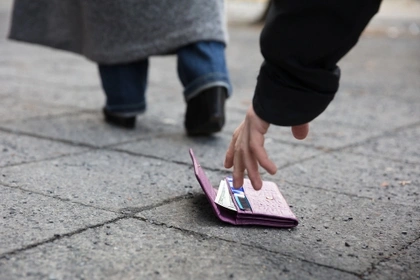What is Section 75 and how can it help you?
Under Section 75 of the Consumer Credit Act, your credit card company has joint liability for any products or services (worth £100 to £30,000) that you’ve paid for using a credit card.
Most of the time, you'll buy an item and be completely happy with it. Occasionally though, the item you’ve received doesn’t match the advert, or it gets lost or broken in transit. When an issue like this occurs, it’ll usually be sorted out by the seller. However, if the seller refuses to help you could still be covered.
Under Section 75, you can apply for a refund from the credit card company if the seller isn’t playing ball.
They share equal responsibility with the seller to rectify any problems, including when:
- the item is faulty
- you don’t receive it
- the seller goes bust
- you've been mis-sold
This protection is free and automatically comes with a credit card (not a debit card). Be aware though, you are likely to be charged interest on a credit card, so, it may work out more expensive.
Tip: To avoid being charged any interest, you need to clear your credit card balance in full and on time every month.
Be aware, there are times when you won’t be protected by Section 75, such as if the purchase is under £100 or over £30,000. Or, you make a purchase via a third-party provider like a travel agent, or PayPal, for example.
What additional forms of protection are available?
On top of Section 75, you can opt for additional forms of protection. These usually come at an extra cost, so you need to weigh up if it will benefit you before getting it added to your credit card.
Chargeback
Section 75 only covers transactions on your credit card between £100 and £30,000. If you have an issue with something that costs less than £100, you may be able to make a claim via your bank, using a scheme called ‘chargeback’.
Chargeback can be applied to credit card and debit card purchases. Unlike Section 75, lenders are not legally obligated to offer it. However, it is regarded as good practice to do so.
When you make a claim, your bank will get in touch with the seller’s bank to request a refund. Bear in mind that you are not guaranteed to get your money back. Also, there can be some variation between how different banks and credit card providers handle chargeback. So, it’s best to check with your provider for the full details.
Tip: If you want to make a claim, the cut-off point is normally 120 days after the purchase date.
Travel credit card
Ordering currency before going abroad can be time-consuming. Plus, carrying cash around in your pocket is not the safest option. If someone steals it, it's very hard to get it back. However, using your regular debit card or credit card abroad can result in additional charges.
If you often travel overseas, it may be worth getting a credit card that's designed for this purpose. We consider the pros and cons:
Pros of a travel credit card
- it may be cheaper to convert currency compared to using a regular credit or debit card
- some offer reward points and air miles that you can redeem towards flights and hotels
- introductory offers may be available (e.g., no annual fee for the first year)
- some come with added protection that covers unexpected expenses that may occur while abroad (e.g., the cost of delays and lost luggage)
Cons of a travel credit card
- they often come with a high annual fee
- you might not need rewards and benefits if you’re unlikely to use them
- introductory offers are for fixed periods, then the cost will increase
- they are usually reserved for those with good to excellent credit scores
You will need to review the policy benefits and terms and conditions to see if they have any value for you.
Identity fraud protection
Identity fraud occurs when fraudsters steal your personal details then use this data to access your money. Credit cards may seem like an easy target. However, credit card providers are very much on the ball when it comes to how and when your credit card is used.
Most providers will monitor your account for suspicious activity and will contact you if they spot any transactions that are out of the ordinary. Some credit card providers also offer an added layer of protection, which involves alerting you whenever changes are made to your credit report.
However, the best protection against identity fraud is to be always vigilant. It's important to check your statements on a regular basis. If you spot any suspicious transactions, report it to your provider straight away. The same goes if your credit card goes missing.
Payment protection insurance (PPI)
Payment protection insurance is a form of income protection on a credit card. It's your decision whether you want to take out PPI. It depends if you think you’ll need it and will benefit from it. You should also factor in the extra cost on top of any interest and charges that come with the card.
Purchase protection insurance
Purchase protection insurance covers goods paid for with your credit card against loss, theft or accidental damage – usually for around three months after purchase.
As we know, you're already protected under Section 75 if something goes wrong when buying goods or services. Purchase protection insurance, on the other hand, can help if something happens to the item after you've bought it.
What’s covered and how long for will vary between credit card providers. So always check the policy for any limitations and exclusions before you sign up. These tend to revolve around maximum claim amounts and the nature of the item that's been lost, damaged or stolen. For instance, commonly excluded items include:
- perishables
- vehicles (and items left in them)
- jewellery
- electronics
Tip: Remember, if you have home contents insurance, you may already be covered.
Refund protection insurance and purchase delivery insurance
Some credit cards offer two extra forms of insurance. Refund Protection Insurance covers items when the seller refuses to give you a refund when they should. Purchase Delivery Insurance protects you if an item isn't delivered to your door or is lost en route.
However, it could be argued that you are already covered for these scenarios under Section 75. Paying an extra premium for this may not be necessary, always read your terms and conditions.
Ocean Credit Card
See if it's a YES before you apply
- Up to £8,000 credit limit
- Checking won't affect your credit score
- Get a response in 60 seconds
Intelligent Lending Ltd (credit broker). Capital One is the exclusive lender.

Disclaimer: All information and links are correct at the time of publishing.






